- Home
- Patricia McLinn
Wedding Series Boxed Set (3 Books in 1) (The Wedding Series) Page 2
Wedding Series Boxed Set (3 Books in 1) (The Wedding Series) Read online
Page 2
"It was," he said in a tone that had just enough humor to escape self-pity. "I can see you think I had the easy role in this whole thing, but let me tell you, waiting rooms can really take it out of you."
She fought another grin. Business. Get back to business. "I'm sure they can. I'm glad everything went well in the end. It all turned out fine. Now -"
His groan cut her off. "Went well? Are you crazy? Midway through my day I had a woman walk into my office and tell me she was in labor, and it went downhill - fast - from there. Went well?"
"I see your point. One expects one's assistant to better arrange such matters."
She regretted the teasing words as soon as they were out.
Nine out of ten men didn't appreciate having their egos pricked by a sharp tongue, even in jest. Not the best way to win prospective clients. She could feel her hopes for entree to Centurian fading as fast as the October daylight. Then she saw the glint of appreciation in his eyes. Paul Monroe, apparently, was the tenth man.
Still, she'd be on safer ground if she got the conversation back to the matter at hand.
"That's right," he said mildly. "An assistant should do this sort of stuff on her own time."
"I can guarantee you that none of the six candidates I have selected for you to choose from will pose a similar problem for you - at least not for the next few months."
He sat up, and she became aware of the way his chest filled the misbuttoned shirt and his forearms swelled below the rolled-back sleeves. She swallowed, and remembered the things Jan Robson had told her about this man.
Not her type. Not her type at all.
"I sort of hoped you'd be my assistant."
Words to slash his presumption that any woman in an office was automatically an assistant welled up in her throat.
She caught the gleam in his eyes just in time. The sort of gleam a kid's eyes had as he waited for the teacher to open the desk with a frog hidden in it.
He'd baited the hook and cast it out there like an expert. And she'd almost fallen for it.
"I don't have the credentials to join the next Mission: Impossible sequel," she said smoothly. She tapped the folder on her desk. "But these people do. Why don't you look at the profiles tonight and let me know in the morning whom you would like. Someone will fill in there tomorrow, then your selection should be available, say -" She checked the appointment file on her screen. " -Monday morning. Is that satisfactory?"
"Very efficient." He said the right words, but his tone didn't have the note of appreciation she might have hoped for. She could feel the "but" coming before his mouth formed the word. "But I don't think I'm in any shape tonight to give these profiles the consideration they deserve. I'd hate to gloss over them, but I'm afraid that's what would happen."
Despite his politely tailored words, Paul Monroe was being a smart aleck. She could be irritated at him for not taking her work seriously, but he obviously didn't take himself any more seriously.
"What do you propose, then?"
He grinned.
Uh-oh.
He sat up, slinging his jacket over one forearm and tucking the folder under his elbow. "As long as you asked, I think it would be a wonderful service of Top-Line Temporaries if you came and told me all about these candidates over dinner. An oral report instead of making me wade through the written report."
"Dinner?"
"Dinner." He stood, and tipped his head as he examined what she feared was her incredibly stupid expression. "You eat, don't you?"
"Of course I eat."
"Yeah, I guess you don't look really anorexic, but you do look a little thin. My mother would love to get her hands on you and fatten you up some."
"Your mother?" What was he doing talking about his mother? He was a client. A client. He'd proposed a business dinner. A little unorthodoxly, perhaps, but a business dinner nonetheless.
"Yeah, Mom's a throwback to the old days. You'd think a Lake Forest matron who does charity luncheons and supports the symphony would have followed the trend into alfalfa sprouts and organic tomatoes, wouldn't you?"
Bette was vaguely aware that his hand under her elbow, warm and firm and so very much there, was supposed to encourage her to rise from her chair. She rose. He handed her her briefcase and she accepted it. He steered her toward the door and she followed.
So he was from Lake Forest, from the North Shore, where suburbs were pristine and upbringings well-to-do.
"But no alfalfa sprouts for Mom. She got fed up on that sort of thing as a kid herself." Surely alfalfa sprouts hadn't been big when his mother was a girl, so he must mean something else, but she had no idea what. Though she could swear she'd seen something like a grimace flicker across his face before being replaced by a grin. "She sticks to the basics of my childhood. And I'm happy to say my childhood was filled with double chocolate brownies and triple-decker sandwiches. All my buddies used to come to my house after school, just for the food. I don't think she's ever served granola in her life. Thank God. G'night."
He waved to Darla, who stared as they made their way through the outer office. "You're leaving, Bette?"
"She's leaving," Paul Monroe answered firmly. "We're going to dinner."
"Great!"
Bette cringed a little at Darla's enthusiasm, which made it sound as if Bette hadn't gone to dinner with a man in a year. And she had. Doug Burton, last winter. Once.
She tried to slow her pace against the tug on her elbow.
"Uh, maybe I should wait . . . lock up."
"Don't you worry. I'll lock up." So much for Darla's help. Her dazzling smile lit her face. "You two go on and have a nice dinner. Have fun."
The last two words might have qualified as an order.
"We will," Paul promised.
* * *
PAUL LIKED THE smooth scratch of Bette Wharton's wool tweed suit jacket against his palm, which he'd cupped under her elbow to guide her footsteps. To him the contact seemed all the stronger for the silence that rested easy around them.
Top-Line Temporaries occupied a neat, efficient suite in a neat, efficient building in the area bounded by Michigan Avenue and Lake Shore Drive, the Chicago River and Oak Street Beach. He was heading to a different neighborhood, not many blocks away, where the mood could swing from class to crass, glass to grit in the time it took to walk from one door to the next.
That variety drew him to the Rush Street area. You could wait to make up your mind until the very last minute and still be within walking distance of just about anything. And if something more appealing came along before you got there, so much the better.
But he knew exactly where he was going to take Bette Wharton tonight. He'd known it nearly from the start.
When he walked in and saw the cloud of dark hair, the eyes as deep a blue as Lake Michigan and the individualistic mouth with its tilted-back top lip, he'd liked her looks, but not the expression of stern concentration she'd worn. He was all too familiar with that look.
Then he'd seen her grin when she thought his eyes were closed. It changed her.
That intrigued him.
Nobody with a mouth like that should be so serious.
She obviously didn't agree. One bit of flippancy escaped her and she looked appalled. He'd watched her stiffen into seriousness, and had become determined to lure out that spark of mischief again.
That was when he knew he'd take her to Mama Artemis's Restaurant. Bette Wharton's exterior, with her conservative suit of gray wool heathered by faint blue, sensible heels and frivolous gold lapel pin, might match her office's neighborhood, but that glint in her eye screamed of Mama Artemis's.
"Do you know where we're going or are you making turns at random?" she asked as they rounded yet another corner.
They could have walked four blocks straight west then five north, but he preferred to mix it up with a turn here and a turn there.
"I know where we're going."
He frowned.
He did know where they were going, had set out with
that destination in mind. That wasn't like him.
"I could have sworn we passed this store before," Bette remarked.
His frown disappeared. He liked the edge of amused skepticism in her voice.
"I said I knew where we were going. I didn't say we were taking the most direct route."
She muffled a splutter of laughter, but he heard it and liked that, too.
"Trying to throw me off the track so I can't find the place again? If this is a secret hideaway, wouldn't it be easier to blindfold me?"
"Aw, you know how nosy people are these days. I was afraid somebody'd stop us or call a cop. Besides, I gave up my handkerchief to the noble cause of mopping Ed Robson's brow hours ago, and I didn't want to risk my good tie. You wouldn't believe how many ties I've ruined blindfolding women wearing mascara." He stopped and turned toward her as if scrutinizing her in the glow of a store's lights. "Unless you're not wearing mascara? It's not too late to use the tie . . ." He let his voice trail off hopefully.
"Your tie would be ruined. I'm wearing mascara." Beneath the words lurked a chuckle. "But all this talk of ties reminds me . . ."
Her hands rose to just above where the well-loosened knot of his tie rested.
Glancing down, he saw he'd misbuttoned his shirt at some point in this frenetic day. But that didn't interest him nearly as much as the revelation that occurred when Bette Wharton's index finger brushed his chest as she finished pushing the third button through its proper hole.
She'd hardly touched him. Considerably less skin had come into contact than in a business handshake, but no one would ever mistake the bolt of heat that tightened his muscles and kicked the breath out of him.
In the uneven light of the store displays, he saw color rise along her neck and sweep into her cheeks. The instant before she could pull her hands away, he caught them in both of his and held them, not quite pressed against his chest.
If he brought her hands back to where her finger had brushed, he wasn't entirely sure what he'd do. But if he let her pull away now, there'd always be a barrier of awkwardness between them.
So he simply held her hands.
Long enough so that both of them could regulate their breathing and convince themselves nothing had happened.
When she took a long breath and looked at him with a smile tinged with wryness, he knew she'd succeeded before he had.
To mask that, he spoke the first words that came to his lips.
"Thanks. I told you those waiting rooms are rough. I think that happened when this guy grabbed me by the collar. He was one of those chicken fathers."
He saw the question flit into her eyes, shoving aside some of the confusion and discomfort, and he felt a spurt of relief almost as strong as the disappointment.
"The fathers too chicken to go into the delivery room," he continued his explanation. "Although this guy had no trouble grabbing me by the shirtfront and demanding what in the hell was taking so long. As if I knew."
Her chuckle assured him her recovery was complete.
"The worst afternoon of my life. Thank God Jan was nearly as efficient in having a baby as she is in everything else. The nurse kept telling me Jan was having an incredibly short labor - as if she thought that should make me feel better."
"Poor Paul." She smiled, apparently unaware it was the first time she'd used his name. She slipped her hands away from him. "What you need is food to fortify you after such a long day."
"Yeah." He pretended to believe the sympathy.
"So maybe we should get to the restaurant."
"Okay." But he didn't move, enjoying the flicker of uncertainty in her eyes, intrigued by the way her thoughts were alternately revealed and hidden. With eyes like that, teasing was irresistible.
"So . . ." she said again.
"What do you mean, 'so'?"
"Don't you want to eat?" she asked.
"Yeah, I want to eat."
"Then don't you think we should get going?"
"No."
"Why not?"
"Because if we go, we won't be able to eat."
He saw annoyance warring with amusement in her deep blue eyes and loved it. "Paul -"
"All right, all right," he gave in with a laugh. "Turn around." He saw her take in the small sign that read Mama Artemis, then laughed again when she turned back to him with a grimace.
"You're a fiend."
"I know." He took her elbow again to guide her through the door and along the narrow hallway that led between two shops before widening to the restaurant proper, tucked into the back of the building. Having his hand around her elbow already felt pleasantly familiar.
"Paul!" A small, round woman with gray streaking the dark hair piled on top of her head wrapped plump arms around him with enthusiasm. "It's been too long! Much too long. You must tell us how you have been all these long months we have seen nothing of you. And your mama and papa, and your dear little sister. But now you come, come and sit, you and your young lady."
Bette would barely have had time to absorb the lightning switch from the frown and scolding to the smile and invitation before she was towed along between crowded tables. But she didn't seem thrown.
He shrugged and headed after them.
In a far corner, amid deep, rich colors aglow in candlelight, Bette slid into a tiny booth, its seat a quarter of a circle so small that when he sat next to her their knees tangled.
"Here. Now you settle, get comfortable, and I get wine. Then we talk about the dinner and I will tell you what you must have to eat." The woman patted Bette's hand and Paul's shoulder, and hurried away.
"Is that Mama Artemis?"
"No. That's her daughter, Ardith. Mama Artemis is much more forceful."
Bette shook her head as she chuckled. "Where are they from? I don't recognize the accent."
"I really don't know. Not that I haven't asked. I have. But when they start talking about it they get into a lot of complicated history, and just when I think I'm starting to follow it, they get excited and lapse into their native language. Best I can tell you is somewhere in southeastern Europe. I guess one of those places that's been passed back and forth a good bit."
Ardith bustled back with a bottle of wine swaddled in a napkin to catch the weeping condensation.
"How is Mama Artemis, Ardith?"
"Ah, Mama. She is the same. Always Mama." She poured pale gold liquid into the chunky clear glass in front of Paul. "She is a terror, Mama." Her affection and admiration and made "terror" a term of respect.
At her gesture, Paul tasted the wine and gave wholehearted approval.
"Glad to hear she's doing well," he said. "Be sure to tell her Jan had her baby today. A boy."
"Ah, a baby! Yes, yes, I will tell her. Such a happy thing, young Jan to have a baby. And you should be having babies, too. You should find a woman, marry her, settle down and have babies."
"Aw, Ardith." The refrain was so familiar he responded automatically, but underneath a memory stirred uneasily of that same refrain spoken in another voice.
"Yes, yes, many babies. Baby girls for you to spoil and baby boys to play with the toys like you do with my nephews. They ask for you. Goran has found three soldiers he wants to show you. And a new engine. You come some Sunday. And you bring your young lady."
As she launched into a description of the meal she would serve them, Paul knew it had been more edict than invitation, and if he didn't bring Bette, he'd spend all his time explaining why.
Ardith left them, apparently satisfied that their choices - more accurately, her choices for them - were in order.
"I don't know why I come here," he grumbled, only half-kidding. A lot could be said for places where nobody asked you to Sunday dinner or cared whom you were with or speculated on when you'd start having babies.
"Isn't the food good?"
"The food's terrific."
"Maybe that's the reason," Bette said as if she meant it, but he spotted a glint in her eyes. "Or maybe it's because you're obviously adored
here."
"You saying I have an ego problem, huh?"
She shrugged, a movement that also raised and lowered her knee a fraction of an inch where it touched his, just enough to send sensation up his leg. "Or maybe it's because they invite you to come over on Sundays to enjoy the children's toys."
He grinned, trying to ignore where that sensation had concentrated. "Occupational hazard."
"Occupational? It sounds more like child's play."
He tilted his head. "Didn't Jan tell you what I do?"
"Of course she did. I couldn't select possible temporaries for you without knowing what they'd be doing."
"What do I do?" He saw her resistance. "Humor me, please?"
She let out a short breath. As she started to answer, part of him experienced inordinate pleasure at the idea that she was willing to humor him.
"You are an independent appraiser, with a good bit of business coming from referrals from Centurian Insurance Group as well as several other major firms, although you do a variety of noninsurance-related appraisals. And Jan mentioned you've worked with some large museums."
He nodded, hoping he'd masked an automatic frown. At least Jan hadn't mentioned the Smithsonian offer specifically. Prestige was one thing, but you had to consider the cost, too.
"That's true as far as it goes, but do you know what I appraise?"
He saw her quick intelligence grasp the ramifications of that question. He could practically hear her thinking that insurance companies rarely hired independent appraisers for the bulk of their business - the cars, boats, houses and routine household goods they could assess through statistics galore.
"A specialty. Something out of the ordinary."
"That's right." He waited.
"What is it? What's your specialty?"
He liked Bette Wharton a lot at that moment. She didn't want to have to ask. He figured she felt not knowing the answer represented a slipup in her preparation. But she didn't allow any of that in her tone.
He wanted to kiss her.
To lean forward across the small table and let his lips explore that up-swung lip of hers, to slip his tongue along it and then inside it.
The blood quickening through his body was a warning. Better get his mind - and hormones - off that track, or he'd be doing just what his imagination had conjured up.

_preview.jpg) Almost a Bride (Wyoming Wildflowers Book 1)
Almost a Bride (Wyoming Wildflowers Book 1)_preview.jpg) Prelude to a Wedding (The Wedding Series Book 1)
Prelude to a Wedding (The Wedding Series Book 1) Reaction Shot (Caught Dead in Wyoming, Book 9)
Reaction Shot (Caught Dead in Wyoming, Book 9) Warm Front
Warm Front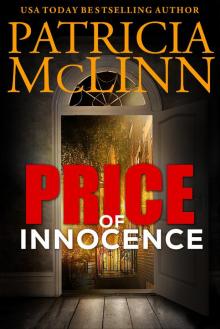 Price of Innocence
Price of Innocence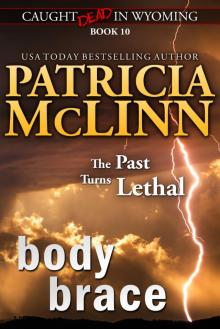 Body Brace (Caught Dead in Wyoming, Book 10)
Body Brace (Caught Dead in Wyoming, Book 10)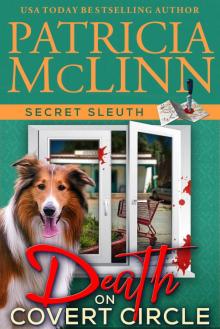 Death on Covert Circle
Death on Covert Circle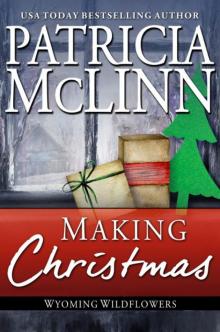 Making Christmas
Making Christmas Death on Torrid Ave.
Death on Torrid Ave.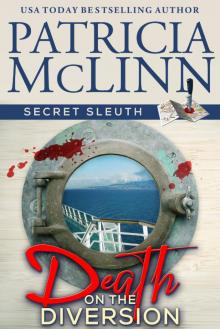 Death on the Diversion
Death on the Diversion The Rancher Meets His Match
The Rancher Meets His Match Widow Woman
Widow Woman The Runaway Bride
The Runaway Bride Hoops
Hoops A Stranger in the Family (Book 1, Bardville, Wyoming Trilogy)
A Stranger in the Family (Book 1, Bardville, Wyoming Trilogy)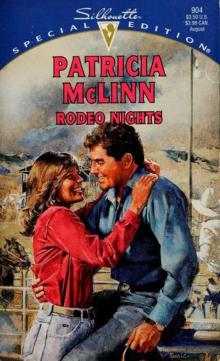 Rodeo Nights
Rodeo Nights Wedding Series Boxed Set (3 Books in 1) (The Wedding Series)
Wedding Series Boxed Set (3 Books in 1) (The Wedding Series)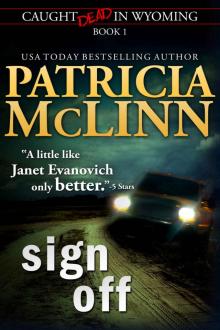 Sign Off (Caught Dead in Wyoming, Book 1)
Sign Off (Caught Dead in Wyoming, Book 1) Prelude to a Wedding
Prelude to a Wedding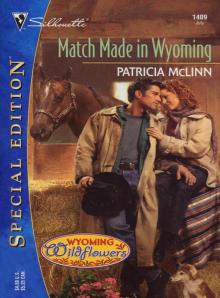 MATCH MADE IN WYOMING
MATCH MADE IN WYOMING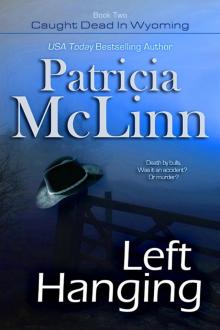 Left Hanging
Left Hanging What Are Friends For?
What Are Friends For?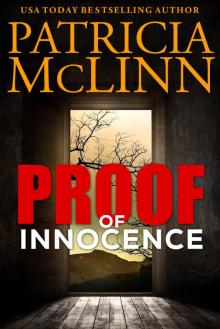 Proof of Innocence
Proof of Innocence Hidden in a Heartbeat (A Place Called Home, Book 3)
Hidden in a Heartbeat (A Place Called Home, Book 3) Baby Blues and Wedding Bells
Baby Blues and Wedding Bells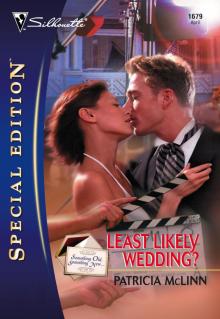 Least Likely Wedding?
Least Likely Wedding? Heart Stealers
Heart Stealers Grady's Wedding
Grady's Wedding Right Brother
Right Brother Wedding of the Century
Wedding of the Century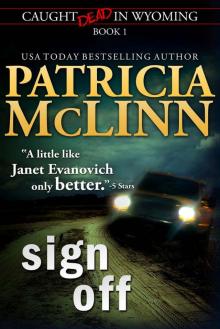 Sign Off
Sign Off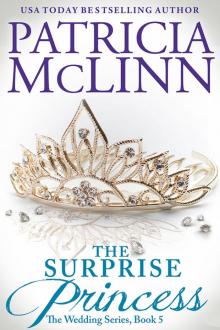 The Surprise Princess
The Surprise Princess Wyoming Wildflowers: The Beginning
Wyoming Wildflowers: The Beginning